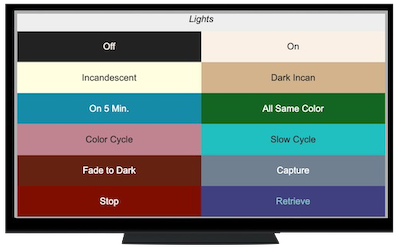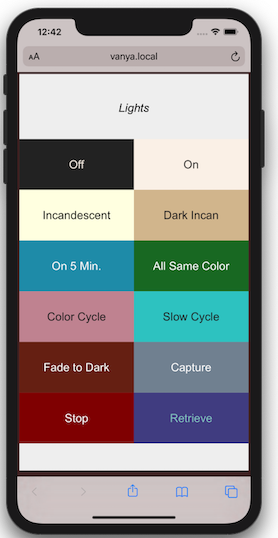Simplified Scripting for Connected Lights
Bardolph lets you control
LIFX
light bulbs through a small scripting language. It is targeted at people who
would like to control or experiment with their lights in a programmatic way
with minimal code.
If you're a bit of a beginning programmer and just want
to experiment, this may be what you're looking for. The language is designed
to "scale down", and be especially easy to use for simple actions with
your lights. If you're more advanced, you might enjoy developing your own
set of scripts to create the ultimate lighting environment and access them
from your phone's web browser.
Implemented in Python, Bardolph runs on any platform that supports Python
3.10 or later. It is open source, distributed free of charge under the
Apache 2.0 license.
The program does not use the Internet to access the bulbs, and no login is
required; all of its communication occurs over the local WiFi network. You
edit scripts with a plain text editor and run them from the command line.
For information about the language, please refer to the
Language Reference.
To try it out, do a
Basic Installation.
Set all the lights to a bright orange, wait 5 seconds, and turn
them to an intense purple.
hue 90
saturation 90
brightness 90
kelvin 2700
set all
time 5 hue 280 set all
Darken each light by 10% of its current brightness while keeping
the same color.
repeat all as the_light
begin
get the_light
brightness {brightness * 0.9}
set the_light
end
If you prefer, control your lights with intuitive RGB coordinates
instead of HSB.
units rgb
red 50
green 75
blue 75
set all
The scripting language has the ability to turn lights on or off, set
their brightness, and control their color. It can use a timed delay or
wait for a keypress between each action. Using their names, you can control
individual lights, groups or locations. If you have any multi-zone lights, the
language allows you to set colors for specific zones.
With a set of useful scripts, you can run a local web server for the purpose
of executing them. Rather than using a platform-specific app, you will
be able to control your lights with any device attached to your WiFi
network that has a basic web browser.
Under normal conditions, the web
server can run on an inexpensive computer like a Raspberry Pi.
With the a 1:1 mapping between a script and its URL, you can launch
a script immediately through a bookmark or home screen shortcut, which
for common actions can be more convenient than navigating an app.
Head over to the
installation page
for instructions on how to install and run the application. If you would
like more information, please see the
complete documentation.
In all my years of writing code, I've never had a bug, but hey, there's a
first time for everything.



